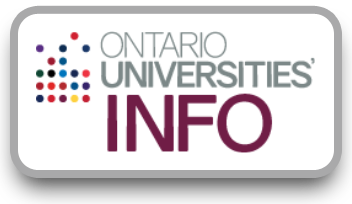Financial Support Information
There are many ways to fund your university studies.
University Scholarships
Most universities offer scholarships. Unlike having to pay back a loan, you do not need to pay back a scholarship. Universities award scholarships based on:
- academic merit,
- financial need,
- extracurricular activities and
- other distinctions.
You can apply for some scholarships and may be automatically considered for others.
Search OUInfo Scholarships for more information.
Renewable Versus Non-Renewable Scholarships
A renewable scholarship is awarded for more than 1 year. Each year, you must meet the university's stated criteria to continue receiving the scholarship.
A non-renewable scholarship is awarded for 1 year only. In some cases, you can re-apply for subsequent years; in other cases, you cannot. Contact the university directly for more information.
Total Value Versus Per-year Value
OUInfo categorizes scholarships according to how much money they provide per year. To calculate the total value of a scholarship, multiply its per-year value by the number of years it can be renewed.
For example, a scholarship that appears in the "Under $1,500" category may look small, but if it is renewable for 4 years, it could have a total 4-year value of up to $6,000. In comparison, a scholarship that appears in the "$3,000–$4,999" category looks larger, but if it is non-renewable (i.e., available for only 1 year), it could have a lower total value than the renewable scholarship.
Other Scholarships, Awards and Prizes
Many organizations offer scholarships, awards and prizes that are often based on competition. You must actively seek out and apply for these. Do your research and remember to apply early.
Look into scholarships offered by organizations that you or your family belong to. Community groups often have scholarships available only to members and their families.
Also, many companies provide scholarships to employees and their families. Ask your parents and family about any financial support programs that may be offered through their workplace.
Ontario Student Assistance Program (OSAP)
OSAP is a financial aid program that can help you with the cost of college or university. Funding is available for both full- and part-time postsecondary students and is based on several factors, including family income.
Ontario Learn and Stay Grant
The Ontario Learn and Stay Grant provides funding for students studying in priority programs in priority communities in Ontario. This program:
- requires you to learn and work in the region where you study,
- responds to labour market needs, including in health care, and
- helps communities get the workers they need for in-demand professions.
In addition to providing free tuition, the funding will cover the cost of:
- compulsory fees,
- books and
- other direct educational costs (e.g., supplies, equipment, etc.).
You can also apply for OSAP to help pay for other expenses, such as living costs.
More about the Ontario Learn and Stay Grant.
Personal Loans
If you have enough financial resources, including other forms of government aid, to cover your expenses allowed by OSAP, OSAP may not cover all your university costs. In this case, you may want to check out personal bank loans or lines of credit. Unlike OSAP, bank loans charge interest immediately. Most banks provide specialized student loans. Contact a few local banks to compare products.

